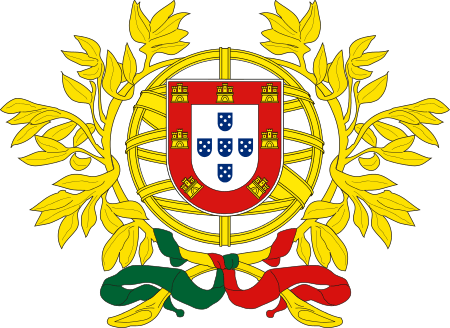Decree-Law 15/93
The Decree-Law 15/93 of January 22 (Portuguese: Decreto-Lei n.º 15/93, de 22 de Janeiro) is a Portuguese drug control law implementing the 1988 United Nations Convention Against Illicit Traffic in Narcotic Drugs and Psychotropic Substances.[1]
| Decree-Law n. 15/93 | |
|---|---|
 | |
| Government of Portugal | |
Long title
| |
| Citation | 1993, c. 234 - 252 |
| Territorial extent | Portugal |
| Enacted by | Ministry of Justice |
| Enacted | 12 November 1992 |
| Assented to | 21 December 1992 |
| Signed by | Mário Soares |
| Commenced | 22 February 1992 |
| Amends | |
| Rectification n. 20/93 Decree-Law n. 81/85 Law n. 45/96 Decree-Law n. 214/2000 Law n. 30/2000 Decree-Law n. 69/2001 Law n. 101/2001 Law n. 104/2001 Decree-Law n. 323/2001 Law n. 3/2003 Law n. 47/2003 Law n. 11/2004 Law n. 17/2004 Law n. 14/2005 Law n. 48/2007 Law n. 48/2007 Law n. 59/2007 Law n. 18/2009 Law n. 38/2009 Decree-Law n. 114/2011 Law n. 13/2012 Law n. 22/2014 Law n. 77/2014 Law n. 7/2017 Law n. 8/2019 | |
| Related legislation | |
| Criminal Code | |
| Summary | |
| Revises drug law | |
| Keywords | |
| Drugs | |
| Status: In force | |
It classifies substances into six categories, Table (Portuguese: Tabela) I through Table VI. Tables I and II are each further broken down into classes: A, B, and C.
This law was also the first that created the crime of money laundering in Portuguese law, and has been amended 25 times since 1993[2].
The introduction of the law, which is primarily aimed at controlling drug trafficking, says that although the use of drugs is socially censurable, that "does not prevent drug addicts from being seen in the first place as persons who are in need of medical assistance" who should receive care. Thus, "drug consumers are presently legally punishable in an almost symbolic fashion" that encourages treatment.[1][nb 1]
While drug use is illegal in Portugal, the law's introduction notes of occasional drug users: "it is necessary above all to avoid them being labelled, marginalised, pushed into an impasse or towards avenues whose only way out is drugs."[1][nb 2] However, the Portuguese government condemned the Dutch pragmatic policy, well known for its absence of user punishment.
Drug trafficking is punished with very harsh sentences; in the most severe cases, it can be punished by 10 years to 25 years of imprisonment.[4]
Table I
Class A
- Diamorphine (Heroin)
- Morphine
- Opium
- 6-Monoacetylmorphine (6-MAM)
- Hydromorphone
- Pethidine
- Methadone
- Hydrocodone
- Oxycodone
- Fentanyl (and all its analogues, i.e. alphamethylfentanyl (AMF; China White), alfentanil, sufentanil, carfentanil, etc.)
- Ketobemidone
- Levorphanol
- Oxymorphone
- MPPP
Class B
- Coca in all forms and all derivatives including:
- Cocaine or Crack cocaine
- Ecgonine (and all derivatives of ecgonine)
Class C
- Cannabis and all derivatives in any form, including tetrahydrocannabinol, but excepting cannabinol
Table II
Class A
|
|
Class B
|
|
Table III
Table III includes special preparations which may include limited amounts of any of the controlled drugs listed under Tables I and II.
Table IV
- Stimulants (mostly anorectics)
- All benzodiazepines (including temazepam, but not including flunitrazepam)
- Barbiturates
- Other sedative-hypnotics
- Meprobamate
- Mesocarb
Table V and VI
Tables V and VI comprise precursor substances (and salts thereof) which may be used to manufacture drugs listed under Tables I and II.
Table V
Table VI
Notes
- "Tal não significa, todavia, que o tocicodependente não deva ser encarado, em primeira linha, como alguém que necessita de assistência médica e que tudo deve ser feito para o tratar, por sua causa e também pela protecção devida aos restantes cidadãos.
Em conformidade com tais afirmações, o consumidor de drogas é sanciondo pela lei vigente de maneira quase simbólica, procurando-se que o contacto com o sistema formal da justiça sirva para o incentivar ao tratamento, na hipótese de ter sido atingido pela toxico-dependência."[3] - "Para os consumidores ocasionais, acima de tudo deseja-se a sua não etiquetagem, a não marginalização, enfim, que o seu semelhante o não empurre para becos sem saída ou que a saída acabe mesmo por ser a droga."[3]
References
- "Decree-Law n.º 15/93 of January 22: Anti-Drug Legislation". Portuguese Legislation in English. Lisbon: Gabinete de Documentação e Direito Comparado. Retrieved 2010-11-02.
- "::: DL n.º 15/93, de 22 de Janeiro". www.pgdlisboa.pt. Retrieved 2019-11-14.
- Ministério da Justiça (1993-01-22). "Decreto-Lei n.º 15/93 de 22 de Janeiro" (PDF). Diário da República (in Portuguese). Lisbon: Imprensa Nacional-Casa da Moeda. I–A (18): 234. ISSN 0870-9963. Retrieved 2010-11-02.
- Inacio, Sergio; Lap, Mario (1999). "Portugal: The law and the enforcement figures". Drugtext Information Services. Drugtext Foundation.
External links
- Classification of Controlled Drugs
- Full text of the law at the Diário da República Eletrónico